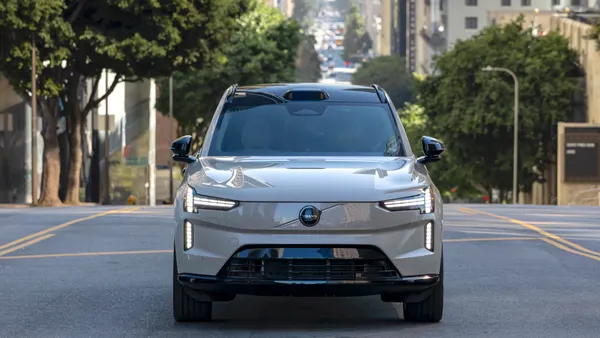Editor's note: This story is part of the WardsAuto digital archive, which may include content that was first published in print, or in different web layouts.
As industries globally struggle to cope with a semiconductor shortage, Bosch opens a new state-of-the-art wafer fab facility at Dresden in the former East German region of its domestic market.
Although earlier indications from Bosch suggested the new “smart factory” would dedicate its output to the needs of the auto industry, company Chairman Volkmar Denner makes no mention of prioritizing automotive over its other products.
Indeed, during the post-presentation Q&A with journalists, Denner (pictured below, left) stresses the plant will “first be supplying semiconductors for our power tools” before providing extra units to the auto industry.
In answer to several questions whether Bosch would attempt to alleviate some of the global drought of semiconductors, Denner insisted the company will stick to its schedule focused on its own products.
“We are now hitting our stride and will start production six months earlier than planned,” he says. “As early as July the first chips will be installed in our power tools and we have brought forward the start of automotive chips from December to September.”
The factory will focus on production of 300-mm silicon substrate wafers with structural widths (nodes) up to 65nm, where 1nm equals one-millionth of a millimeter. These can be used in a variety of digital products connected by the Internet of Things.
“Semiconductors are the essential building blocks for the Internet of Things and only with them will connectivity be realized,” Denner says. “These are now in demand more than ever, and the current supply shortage of semiconductors is also owing to the boost the pandemic has given to digitalization.
“The semiconductors from Dresden will make vehicles safer, more efficient and better. In electric vehicles, for example, they control energy flows and orchestrate the interplay of energy sources and horsepower. In the future, they will be augmented by quantum technology and we will see sensors that can measure 100 times more precisely than at present.”
Denner emphasizes the highly automated nature of the new facility which, itself, was designed in the virtual world.
“Chip production itself is a trailblazer and is highly automated at the leading edge of Industry 4.0,” he says. “Semiconductors are made in smart factories and this factory actually exists twice, once in a digital form and now in the real world. The project took three years and digital solutions helped with the commission of plant and machinery.
“Thanks to augmented reality, engineers from around the world were able to share their knowledge with associates on site and were able to support them,” he says. “In running operations, as well, digital transparency offers concrete benefits. Machine maintenance can be done predictively, and complications can be solved quickly before they crop up.
“Processes are also analyzed by AI which can detect the tiniest errors, however small. They are more precise than the human eye and faster than the human brain. With AI we will be taking production to the next level. In production, it saves time and money where it guides the wafers through as many as 700 process steps.
“We are constantly collecting and assessing data. At Dresden, this data comes to the equivalent of 500 pages of text a second or 42 million pages a day. Smart algorithms are used to evaluate this data in real time – this too is key to the rapid rollout of semiconductors.”










